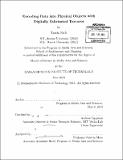| dc.contributor.advisor | Andrew Lippman. | en_US |
| dc.contributor.author | Rich, Travis (Travis Sebastian) | en_US |
| dc.contributor.other | Massachusetts Institute of Technology. Department of Architecture. Program in Media Arts and Sciences. | en_US |
| dc.date.accessioned | 2013-11-18T19:22:24Z | |
| dc.date.available | 2013-11-18T19:22:24Z | |
| dc.date.copyright | 2013 | en_US |
| dc.date.issued | 2013 | en_US |
| dc.identifier.uri | http://hdl.handle.net/1721.1/82431 | |
| dc.description | Thesis (S.M.)--Massachusetts Institute of Technology, School of Architecture and Planning, Program in Media Arts and Sciences, 2013. | en_US |
| dc.description | Cataloged from PDF version of thesis. | en_US |
| dc.description | Includes bibliographical references (p. 125-128). | en_US |
| dc.description.abstract | This thesis presents and outlines a system for encoding physical passive objects with deterministic surface features that contain identifying information about that object. The goal of such work is to take steps towards a self-descriptive universe in which all objects contain within their physical structure hooks to information about how they can be used, how they can be fixed, what they're used for, who uses them, etc. By exploring modern manufacturing processes, several techniques for creating these deterministic textures are presented. Of high importance is the advancement of 3D printing technologies. By leveraging the rapid prototyping capabilities such machines offer, this thesis looks at how personalized objects and draft models may be encoded with data that allows annotations, ideas, and notes to be associated with physical points across that object. Whereas barcodes, QR codes, and RFID tags are often used to associate a single object with a single piece of data, this technique of encoding surfaces will allow for many points of identification to be placed on a single object, enabling applications in learning, group interaction, and gaming. | en_US |
| dc.description.statementofresponsibility | by Travis Rich. | en_US |
| dc.format.extent | 128 p. | en_US |
| dc.language.iso | eng | en_US |
| dc.publisher | Massachusetts Institute of Technology | en_US |
| dc.rights | M.I.T. theses are protected by
copyright. They may be viewed from this source for any purpose, but
reproduction or distribution in any format is prohibited without written
permission. See provided URL for inquiries about permission. | en_US |
| dc.rights.uri | http://dspace.mit.edu/handle/1721.1/7582 | en_US |
| dc.subject | Architecture. Program in Media Arts and Sciences. | en_US |
| dc.title | Encoding data into physical objects with digitally fabricated textures | en_US |
| dc.type | Thesis | en_US |
| dc.description.degree | S.M. | en_US |
| dc.contributor.department | Program in Media Arts and Sciences (Massachusetts Institute of Technology) | |
| dc.identifier.oclc | 862825046 | en_US |
